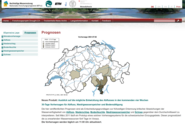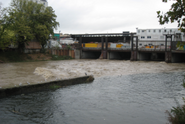Stream water temperatures influence water quality, with effects on aquatic biodiversity, drinking-water provision, electricity production, agriculture, and recreation. Therefore, stakeholders would benefit from an operational forecasting service that would support timely action. Deep-learning models are well-suited to providing probabilistic forecasts at individual stations of a monitoring network. Here, we train and evaluate several state-of-the-art models using 10 years of data from 54 stations across Switzerland. Static catchment features, time of the year, meteorological observations from the past 64 d, and their ensemble forecasts for the following 32 d are included as predictors in the models to estimate daily maximum water temperature over the next 32 d. Results show that the temporal fusion transformer (TFT) model performs best, with a continuous rank probability score (CRPS) of 0.70 °C averaged over all lead times, stations, and 90 forecasts distributed over 1 year. The TFT is followed by the recurrent neural network encoder–decoder, with a CRPS of 0.74 °C, and the neural hierarchical interpolation for time series, with a CRPS of 0.75 °C. These deep-learning models outperform other simpler models trained at each station: random forest (CRPS = 0.80 °C), multi-layer perceptron neural network (CRPS = 0.81 °C), and autoregressive linear model (CRPS = 0.96 °C). The average CRPS of the TFT degrades from 0.38 °C at lead a time of 1 d to 0.90 °C at a lead time of 32 d, largely driven by the uncertainty of the meteorological ensemble forecasts. In addition, TFT water temperature predictions at new and ungauged stations outperform those from the other models. When analyzing the importance of model inputs, we find a dominant role of observed water temperature and future air temperature, while including precipitation and time of the year further improves predictive skill. Operational probabilistic forecasts of daily maximum water temperature are generated twice per week with our TFT model and are publicly available at https://www.drought.ch/de/impakt-vorhersagen-malefix/wassertemperatur-prognosen/ (last access: 20 March 2025). Overall, this study provides insights into the extended-range predictability of stream water temperature and into the applicability of deep-learning models in hydrology.
Siehe DOISiehe Institutional Repository DORA





